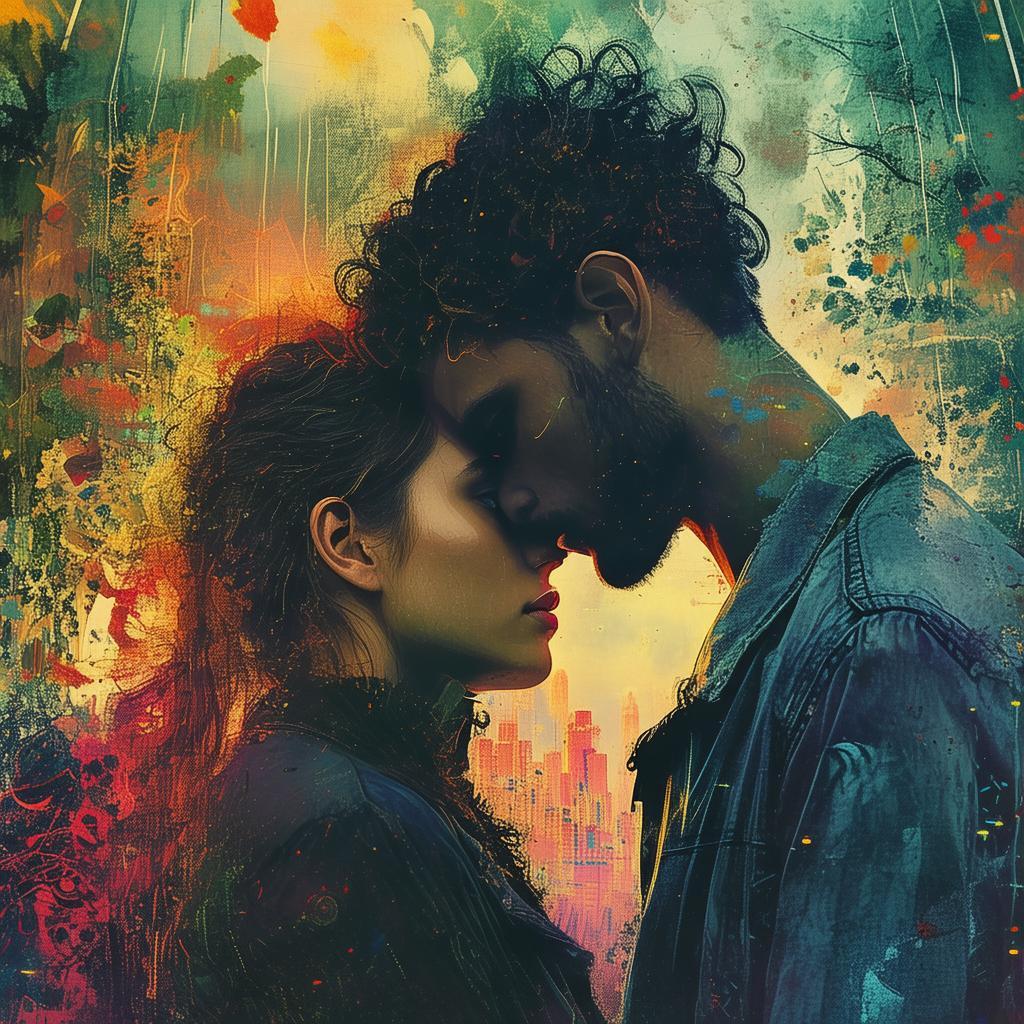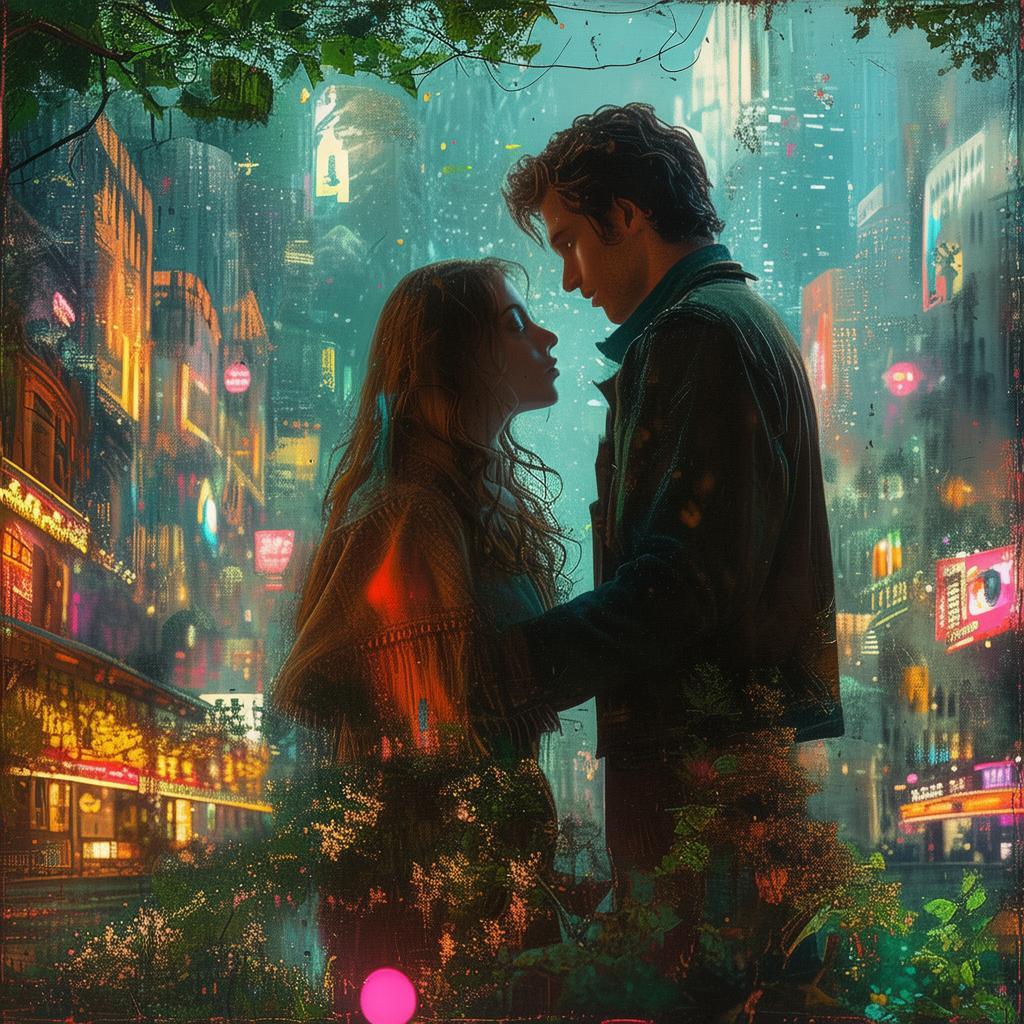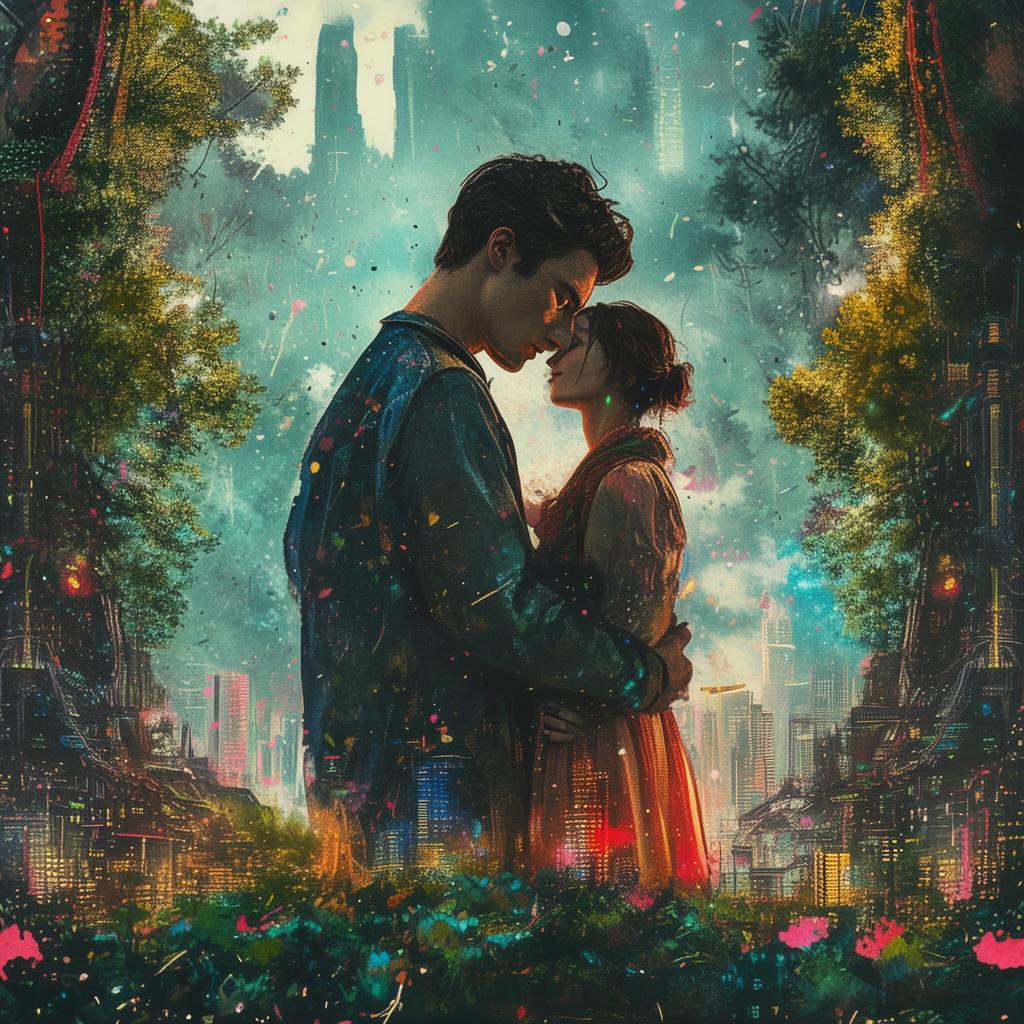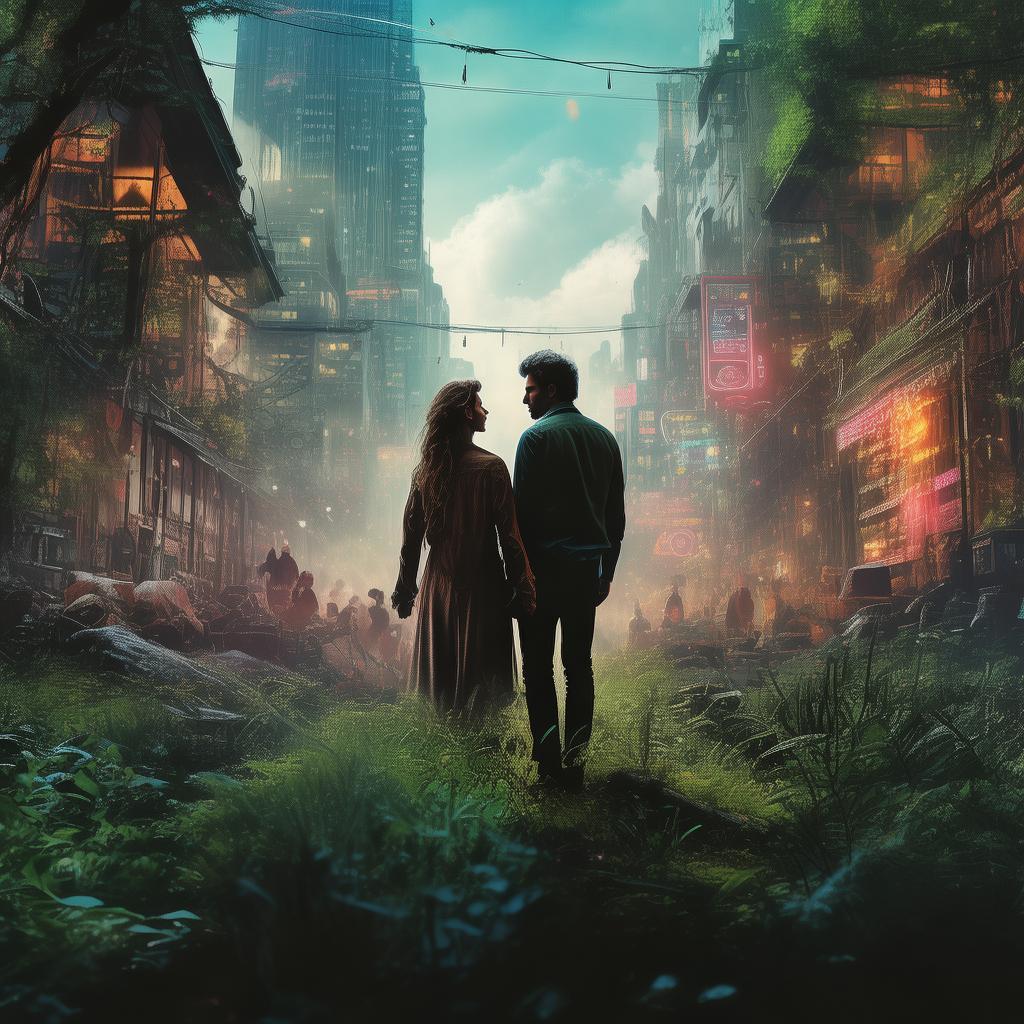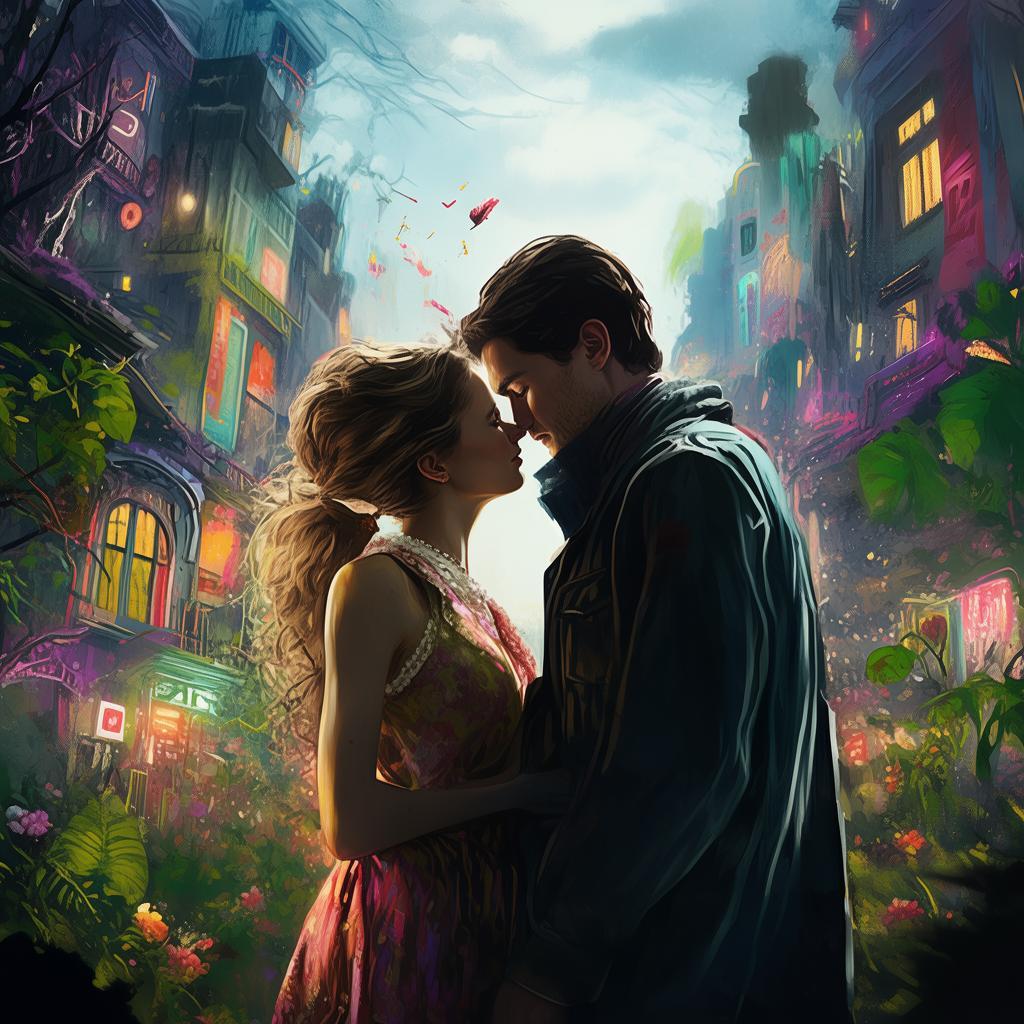Whispers of Forbidden Love: A Love That Broke the Chains
The bustling streets of Beijing in the 1940s were a mosaic of life, culture, and political unrest. Amidst the chaos, there lived two individuals whose lives were destined to intertwine in a love that would challenge the very fabric of society.
Liang Wei, a young, idealistic writer, was passionate about the arts and the pursuit of truth. He was a man of few words, his thoughts often buried deep within the pages of his journal. His only escape from the harsh realities of the world was the company of his close friend, Mei, a spirited and headstrong artist whose vibrant colors painted a world of hope and freedom.
Mei, with her fiery spirit and unyielding determination, was the antithesis of Liang’s reserved nature. She was a beacon of light in the darkness, her laughter a melody that could pierce through the most oppressive of times. Mei’s art was her voice, her way of expressing the pain and beauty of her world. She had a secret, though, one that would change everything: she was the daughter of a high-ranking official in the Communist Party.
Their friendship was a delicate dance, a silent agreement to never cross the line into forbidden territory. But as the years passed, their bond deepened, and the line between friendship and something more blurred. Liang, who had always admired Mei from afar, found himself drawn to her spirit, her courage, and her passion for life.
One evening, as the city was enveloped in the glow of streetlamps, Liang found himself standing outside Mei’s apartment, his heart pounding with a mixture of fear and longing. He had written her a letter, a confession of his feelings, and now he must deliver it. As he pushed the doorbell, his hands trembled, and his breaths came in short, uneven gasps.
Mei opened the door, her eyes wide with surprise. She stepped back, allowing Liang to enter. The apartment was filled with the scent of lavender and the soft glow of an oil lamp. Liang handed her the letter, his voice barely above a whisper.
“Read it,” he said, his eyes never leaving hers.
Mei took the letter, her fingers trembling as she unfolded it. As she read, her expression changed from surprise to sadness, and finally to a deep, heartfelt smile. She looked up at Liang, her eyes filled with tears.
“I knew,” she whispered, “but I never thought you would say it.”
Their relationship blossomed in secret, a whispered promise of love in the face of a world that would not tolerate such a union. They met in the quiet corners of the city, in the dimly lit cafes, and in the vast, open spaces of the parks. They shared stories, dreams, and the rawest of emotions, their love growing stronger with each passing day.
But their love was not without its challenges. Mei’s father, a staunch supporter of the Communist Party, was fiercely against their relationship. He saw Liang as a threat to his daughter’s future and to the ideals he held dear. He attempted to keep them apart, using his influence to cast a shadow over Liang’s life.
Liang, however, was not one to be deterred. He stood firm in his love for Mei, his heart as steadfast as the ancient walls of Beijing. He began to write about their love, his words a testament to the power of forbidden passion. His stories, filled with emotion and raw honesty, began to resonate with the people, who saw in them a reflection of their own struggles and desires.
As their love story spread, it became a symbol of hope and defiance. People whispered about Liang and Mei, their names becoming synonymous with the very essence of forbidden love. But their happiness was short-lived.
One night, as they walked along the river, a group of men approached them, led by Mei’s father. They were armed, their faces twisted with anger and determination. Liang, understanding the gravity of the situation, stepped in front of Mei, his body shielding her from the oncoming violence.
“Leave her alone,” Liang said, his voice steady despite the fear that gripped him.
Mei’s father raised his hand, and in a swift motion, he struck Liang, knocking him to the ground. Mei, unable to bear the sight of Liang’s suffering, stepped forward, her eyes filled with tears.
“Please, stop!” she cried.
But it was too late. The men, emboldened by their leader’s presence, began to beat Liang mercilessly. Mei, in a fit of rage and despair, pulled out a small, hidden knife and lunged at her father. He dodged the blade, but Mei’s actions had given Liang the chance to escape.
As he ran, Liang’s heart was heavy with loss and sorrow. He knew that Mei’s father would never allow them to be together, and he knew that Mei would be punished for her actions. He ran until he reached the safety of the city’s outskirts, his heart breaking with each step.
Mei, in the aftermath of the attack, was imprisoned and forced to watch as her father’s influence dismantled her life. She was stripped of her freedom, her spirit broken, and her art no longer a voice of rebellion but a silent plea for understanding.
Years passed, and the world changed. The Communist Party came to power, and Liang’s stories were banned. He was forced into hiding, his love for Mei a secret that he could no longer share with the world. He spent his days writing, his heart heavy with the weight of unspoken words.
One day, as he sat in a dimly lit room, his journal open in front of him, he found a letter. It was from Mei, written on the same paper as his journal entries. She had escaped the prison, her spirit unbroken, and she had found a way to reach him.
Dear Liang,

I have been thinking of you every day. The pain of losing you has been like a cancer eating away at my soul. But I have learned that love is not just about being together, but about being apart and still loving. I have found a way to honor our love, to keep it alive in my heart and in my art.
I have painted a portrait of you, the man who taught me to dream, to love, and to fight for what is right. I have hidden it in a secret place, a place where it can never be found. It is my way of keeping you close, even when we are apart.
I hope that one day, we will be together again, in a world where love is not forbidden, but celebrated. Until then, I will live for you, for our love, and for the hope that one day, it will be free.
Forever yours,
Mei
Liang read the letter, his eyes filling with tears. He knew that Mei was alive, that her spirit was unbroken. He knew that their love had not been in vain. He continued to write, his words a testament to the enduring power of love, even in the face of adversity.
And so, amidst the tumultuous streets of Beijing, two souls found solace in a love that defied all odds. Their story, a love that broke the chains, continued to resonate through time, a testament to the enduring power of love and the unyielding spirit of two individuals who dared to dream of a world where love was free.
✨ Original Statement ✨
All articles published on this website (including but not limited to text, images, videos, and other content) are original or authorized for reposting and are protected by relevant laws. Without the explicit written permission of this website, no individual or organization may copy, modify, repost, or use the content for commercial purposes.
If you need to quote or cooperate, please contact this site for authorization. We reserve the right to pursue legal responsibility for any unauthorized use.
Hereby declared.
